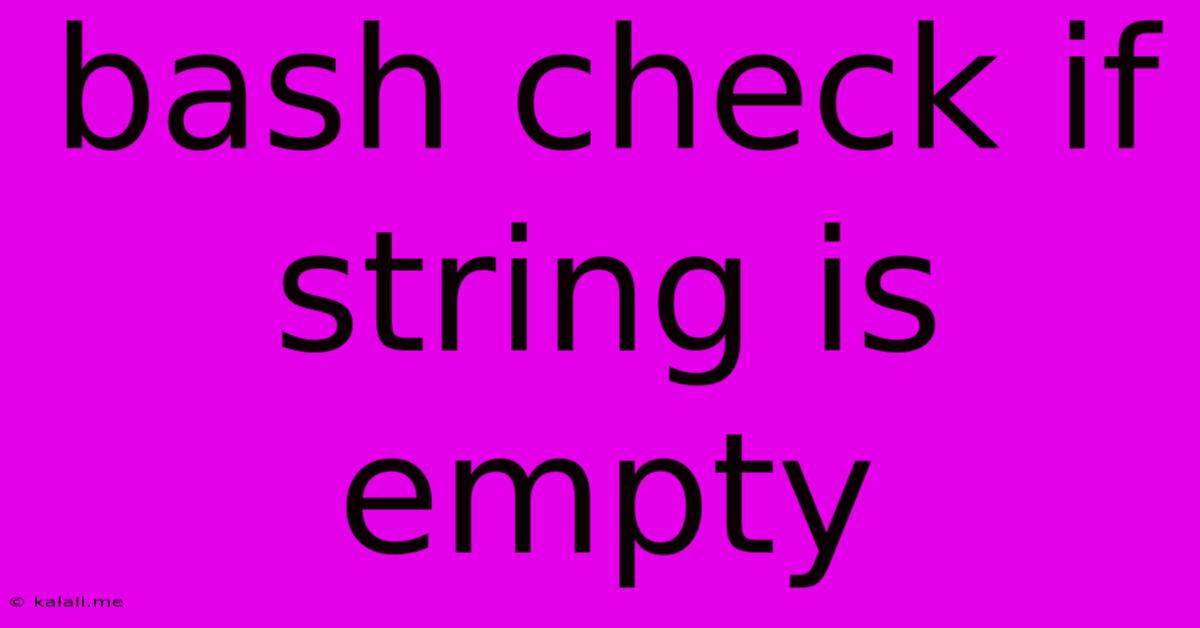Bash Check If String Is Empty
Kalali
Jun 09, 2025 · 3 min read

Table of Contents
Bash Check if String is Empty: A Comprehensive Guide
This article provides a comprehensive guide on how to effectively check if a string is empty in Bash scripting. Knowing how to perform this seemingly simple task is crucial for writing robust and reliable scripts. We'll explore several methods, each with its own advantages and disadvantages, and provide examples to help you choose the best approach for your specific needs.
Why is checking for empty strings important? Empty strings often represent missing or invalid data. Failing to check for them can lead to errors, unexpected behavior, and even security vulnerabilities in your scripts. Therefore, incorporating robust empty string checks is a best practice for any serious Bash programmer.
Method 1: Using the -z operator
The simplest and most efficient method to check for an empty string in Bash is using the -z operator. This operator returns true if the length of the string is zero.
string=""
if [ -z "$string" ]; then
echo "String is empty"
else
echo "String is not empty"
fi
Explanation:
string="": This initializes an empty string. Remember to always quote your variables ("$string") to prevent word splitting and globbing issues.[ -z "$string" ]: This is the core of the check.[ ... ]is a shorthand for thetestcommand.-zspecifically tests for a string of zero length.echo ...: This prints the appropriate message based on the result of the test.
This method is concise, readable, and highly performant, making it the preferred approach in most cases.
Method 2: Using string length with ${#string}
Another approach involves checking the length of the string using parameter expansion. The ${#string} syntax returns the length of the string.
string="hello"
if [ "${#string}" -eq 0 ]; then
echo "String is empty"
else
echo "String is not empty"
fi
Explanation:
${#string}: This expands to the length of the string.-eq 0: This compares the length to zero using the arithmetic equality operator.
This method is slightly less concise than the -z operator but offers a more explicit representation of the length check. It’s useful if you also need the string length for other operations within your script.
Method 3: Using [[ ]] and -z (for more complex conditions)
For more complex conditional statements, the [[ ]] construct can be beneficial. It offers enhanced features compared to the [ ] syntax.
string=" " #String with only spaces
if [[ -z "$string" || "$string" == " " ]]; then
echo "String is empty or contains only spaces"
else
echo "String is not empty and does not contain only spaces"
fi
This example demonstrates how to combine multiple conditions using || (OR) within the [[ ]] construct. This allows for more sophisticated checks, for example, handling strings consisting only of whitespace.
Choosing the Right Method
For most situations, the -z operator (Method 1) provides the most efficient and readable solution for checking if a string is empty in Bash. Method 2 offers an alternative if you also need the string's length, while Method 3 is beneficial when dealing with more intricate conditional logic involving empty or whitespace-only strings. Remember consistent variable quoting is crucial for preventing unexpected script behavior. Always prioritize clear, maintainable code over overly clever shortcuts.
Latest Posts
Latest Posts
-
How To Change Google Map Label Symbol
Jun 09, 2025
-
Not Enough Hot Water From Water Heater
Jun 09, 2025
-
Can You Use A Smaller Radiator Than You Specified Engine
Jun 09, 2025
-
How To Download Texts From Android
Jun 09, 2025
-
Can You Have Aerosol Cans In Checked Luggage
Jun 09, 2025
Related Post
Thank you for visiting our website which covers about Bash Check If String Is Empty . We hope the information provided has been useful to you. Feel free to contact us if you have any questions or need further assistance. See you next time and don't miss to bookmark.